Advertisement
In 'Natural Born Heroes,' McDougall Leaps Into Parkour
Resume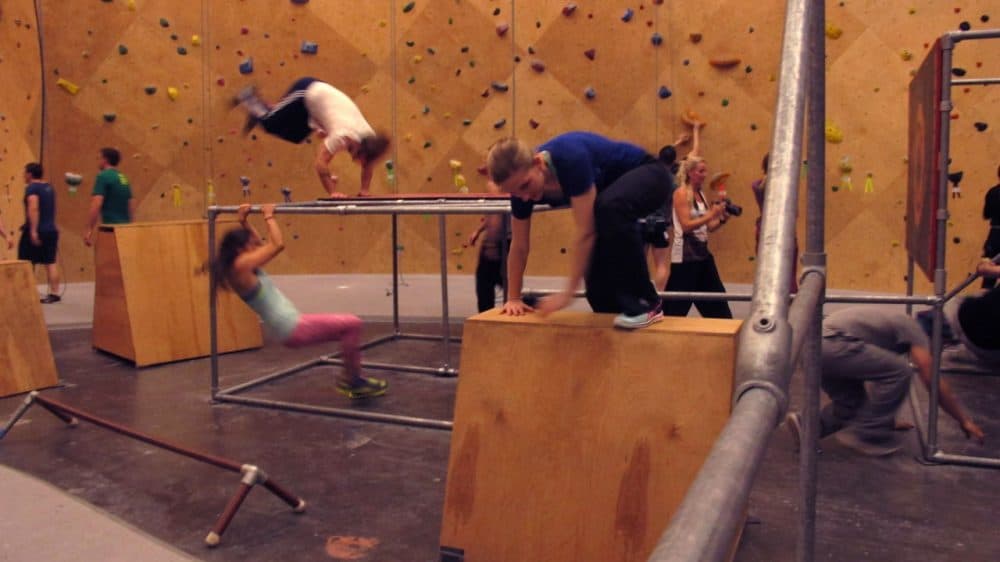
Bruce Lee, Lawrence of Arabia and the fictional demigod Percy Jackson share supporting roles in the new book "Natural Born Heroes." The idea goes something like this: all of these men started out as average, ordinary humans before they learned to do extraordinary things. And, if they can do it, the book says, so can we. Only A Game's Karen Given recently met up with the author on tour.
Parkour And Our 'Animal Selves'
I'm usually game for Christopher McDougall's experiments. When we first met in 2010, I took off my running shoes and joined him for a barefoot jog.
"Born to Run," McDougall's 2009 book, sold 3 million copies worldwide and was credited with launching the barefoot running movement. Put "Born to Run" and "Natural Born Heroes" side by side on a bookshelf, and you might have trouble telling them apart. But a similar cover isn't the only thing they have in common.
"'Born to Run' I got a ton of credit for, like, launching the barefoot movement," McDougall told me recently at a stop on his current book tour, which doubles as a parkour clinic. "It’s like, 'Dude, I was the dude on the surfboard that happened to be there when the wave came. Like I saw the wave coming, but it was coming.' And I feel the same way about this now."
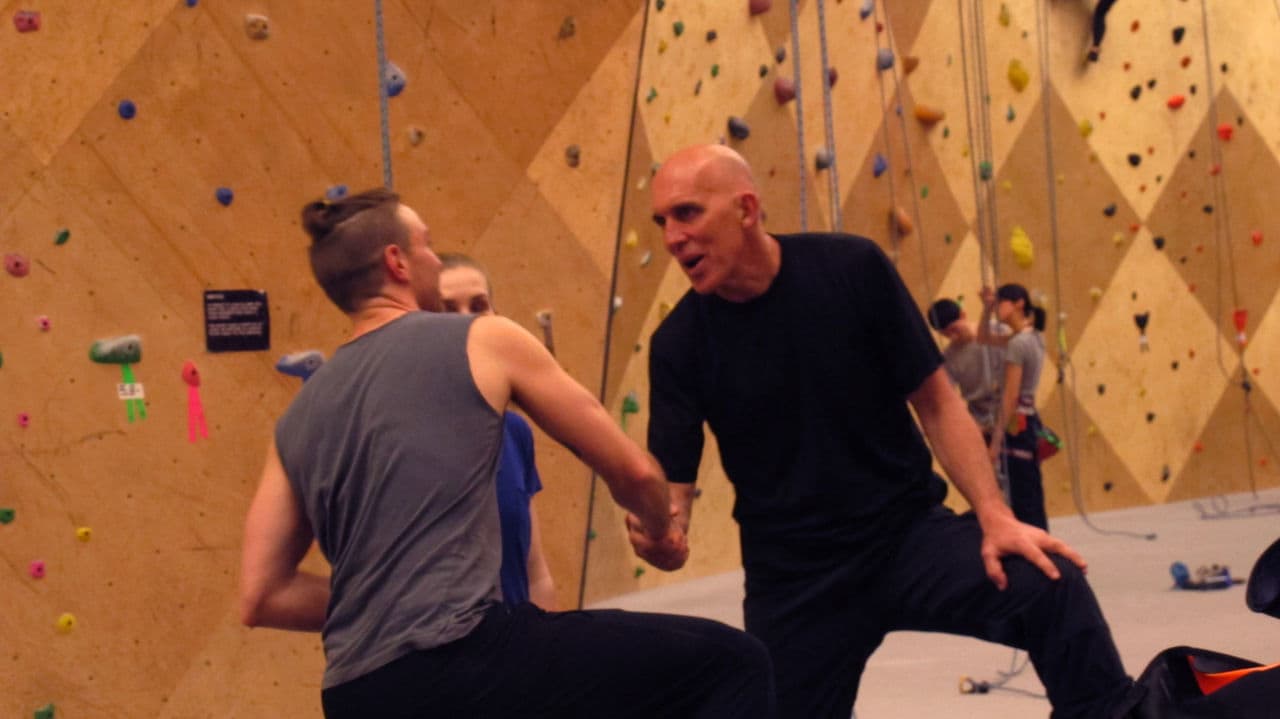
"I had no idea I could move that way," said Amelia Failing, who attended the event at an indoor climbing gym in Somerville, Mass. "I think that was the most exciting part."
Parkour isn't an easy thing to define, but it's basically just a way of moving around a space — usually an urban landscape — by jumping and climbing over obstacles instead of going around them. And Failing had never done anything like it before.
"Today I jumped on top of that five-foot block there," she told me with a laugh, "jumped on top of the platform that’s a foot higher than that, contemplated jumping onto the wall, but then thought maybe I should give that until the next time. It felt like I was on adult monkey bars."
"I've got to say, the look on your face was like a 5-year-old," I said.
"I know! That’s what I felt like. I was trying not to smile so much but I was having so much fun."
This clinic may have been fun, but McDougall said "natural movement," the discipline that inspired parkour, has its roots in a turn-of-the-century tragedy.
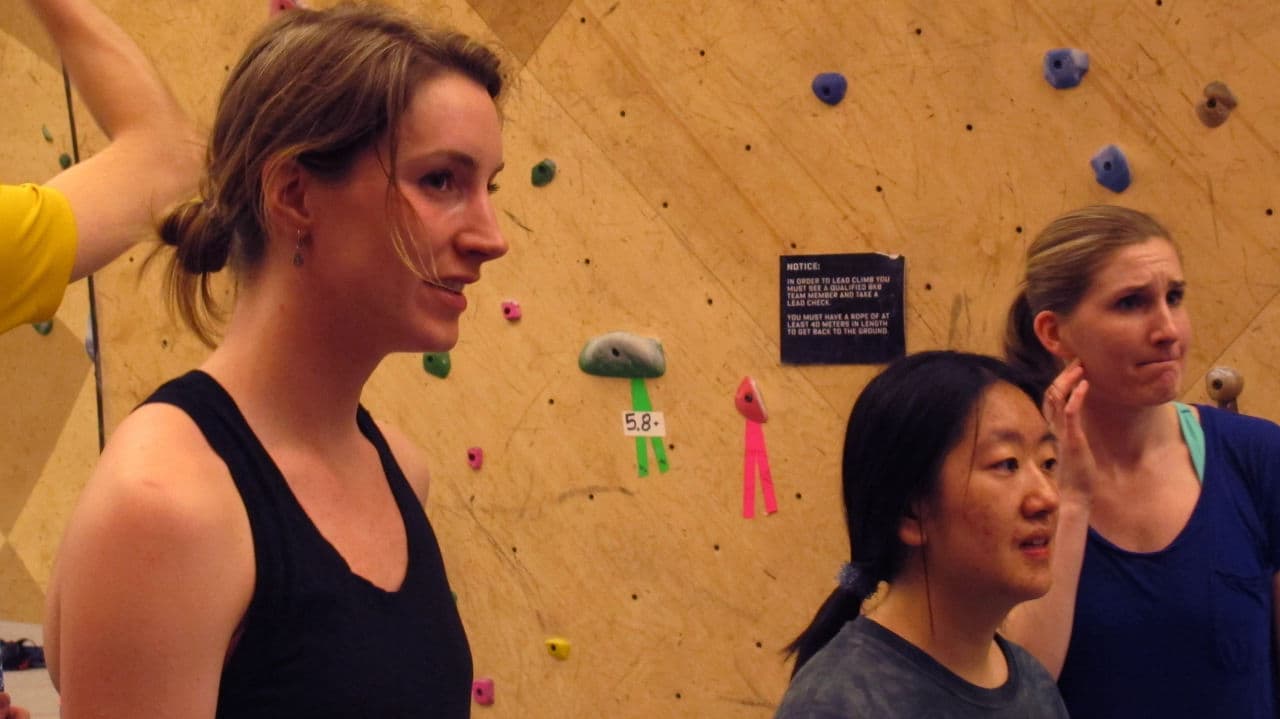
"There was a French naval officer watching a volcano explode and he’s trying to rescue people," McDougall explained. "And he’s watching people die because they can’t master these simple, little movements. They can’t climb a rope to get up on the boat. They can’t jump across a little ravine."
Georges Hebert believed humans had gotten away from their animal selves — the part of us that instinctively knows how to run and climb and fight. He set out to re-introduce those skills to a generation of French marines, but World War I began and Europe had more important things to worry about.
For the next 100 years, Hebert's teachings were mostly forgotten — until a couple of guys in France in the 1980s started to bring them back.
A Worldwide Reach
The video above has 38 million views on YouTube, and there are hundreds more just like it. I can barely watch as these guys climb walls, leap over parked cars and jump from rooftop to rooftop, with a completely unnecessary aerial somersault in between.
Parkour spread across the world with videos like this one. By the time the sport made it to Pennsylvania, where McDougall lives, he knew he'd found his next book.
"I was like, 'Oh, man, I know I gotta do this because I gotta research this book,'" he recalled. "'But I am going to the hospital.'”
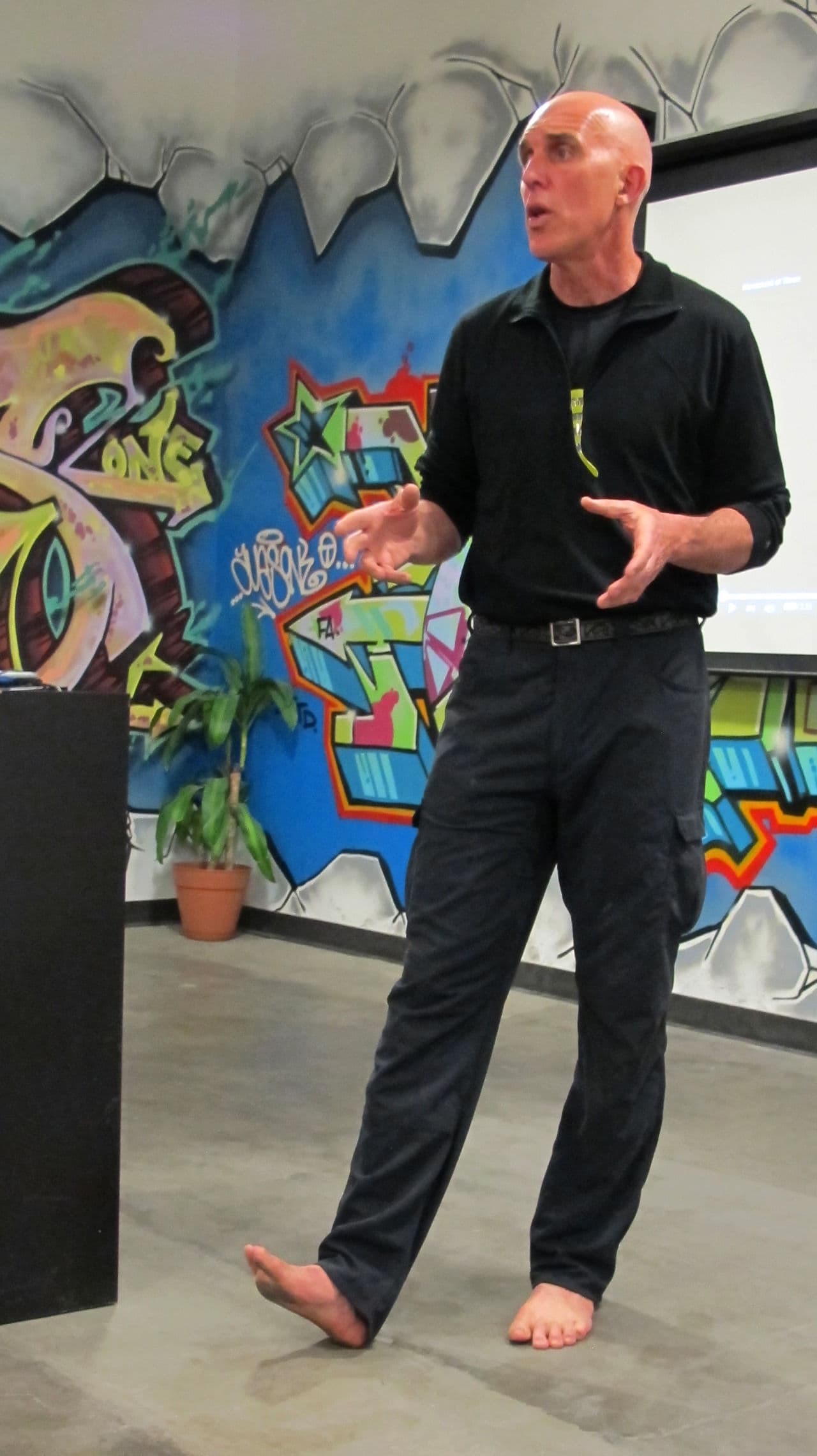
I can barely contain my skepticism. Jumping from building to building? Leaping over parked cars? That's just crazy talk.
"You look remarkably unconvinced," McDougall told me.
McDougall slipped off his sandals and pushed off the table in front of us like a spring. Almost effortlessly, the guy who compares his body type to a refrigerator hopped up on the table and back down again. Even I had to admit, it kind of looked like fun.
"You are hardwired to get satisfaction and joy from anything that’s good for the species," he said. "So if it’s good for your animal self, you’re going to be rewarded for it. You get a burst of endorphins."
Those endorphins are why, McDougall believes, this year more people will complete an adventure challenge — like the Tough Mudder or Spartan Race — than will run a half marathon.
"This institutionalized, machine-based fitness thing doesn't work," he said. "We don’t like it. The dropout rate in gyms is 60 percent. They sign up in January and by Easter they’re gone. Every year. It’s the only business that makes a profit from the fact that people hate it."
Safety First
When McDougall suggested runners ditch their traditional shoes, millions of us did — and so many got injured that the most popular brand of minimalist shoes was recently forced to settle a $3.75 million class action lawsuit.
Dan Edwardes of Parkour Generations, a London-based training group, says he hopes "Natural Born Heroes" does for parkour what "Born to Run" did for the barefoot running movement (except for that part where people got hurt).
"The reason we started teaching was that, you know, young people, kids especially, were going out and doing it without any guidance," Edwardes said. "So we wanted to create a place where they could come get good guidance if they wanted it and learn safely and correctly."
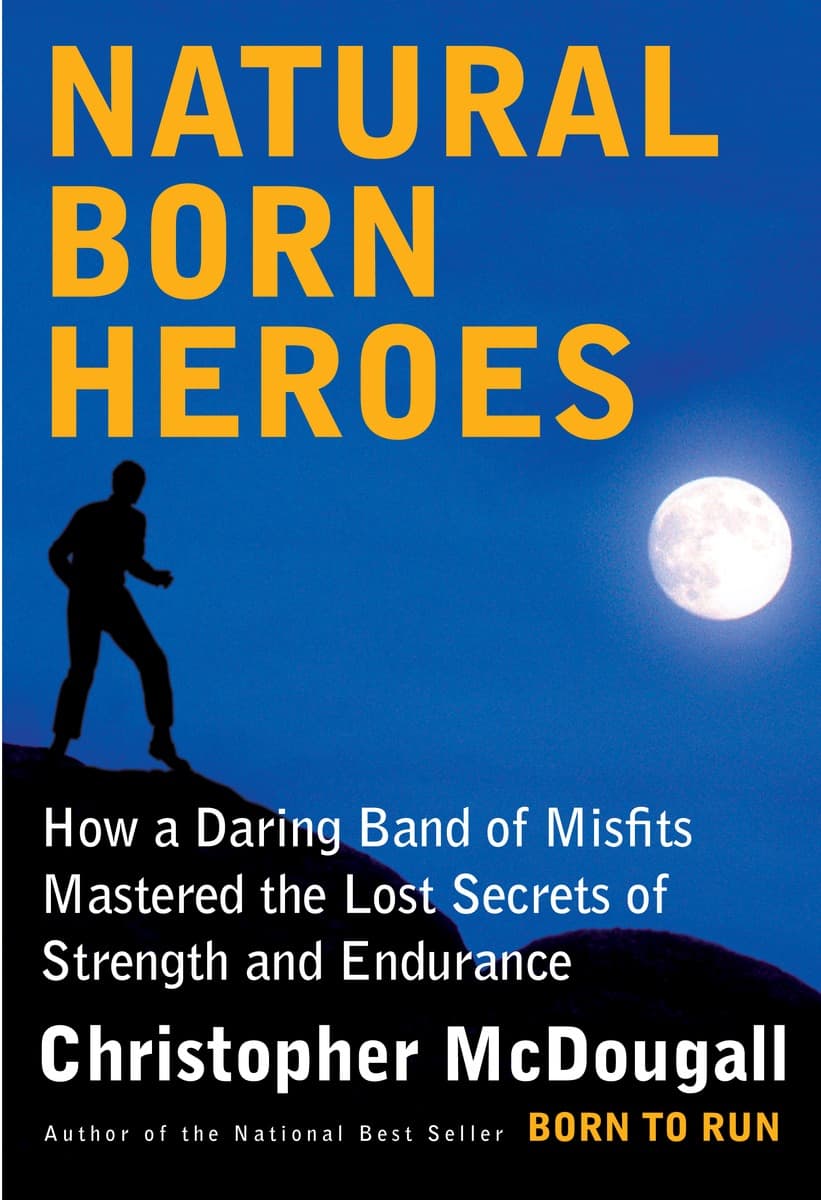 McDougall and Edwardes are working this book tour together. After McDougall got the crowd at the Somerville climbing gym excited about parkour, Edwardes let them give it a try. But he didn't show them exactly what to do. Edwardes said parkour is about challenge, discovery, exploration, adaptation and self-knowledge. And it's definitely not about all those pretty jumps you can watch on your computer screen.
McDougall and Edwardes are working this book tour together. After McDougall got the crowd at the Somerville climbing gym excited about parkour, Edwardes let them give it a try. But he didn't show them exactly what to do. Edwardes said parkour is about challenge, discovery, exploration, adaptation and self-knowledge. And it's definitely not about all those pretty jumps you can watch on your computer screen."Kids, they climb on stuff. They walk on the wall, not on the pavement — you know they’ll balance on things. They crawl around, they’ll explore and they love doing that. It’s a natural thing, to play. It’s play, right?" Edwardes said. "And parkour is — in a way it’s just allowing, adults especially, it’s like giving them permission to play again. And all we do is we give it a little bit of focus, a little bit of discipline, but effectively it’s play."
Will "Natural Born Heroes" inspire millions of exercisers to cast off traditional gyms the way "Born to Run" led so many to try running without shoes? As he watched the parkour students climb over walls, and each other, Christopher McDougall hoped that it will.
This segment aired on April 25, 2015.

